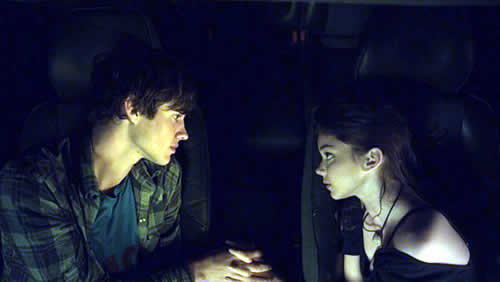 Conception is a sexy romantic comedy that follows nine couples in different stages of their relationships on the night they conceive. We see a long-married couple who have recently added having sex to their chore wheel; a bickering twosome can barely stop trading barbs long enough to have passionate sex in the shower; teen sweethearts strike a bargain: she’ll have sex with him if he gives up meat; a sleep-deprived mom scarcely has the energy to nurse her newborn, let alone make love to her neglected hubby; a woman on a semi-disastrous blind date quickly opts for intimacy so she can stop making inappropriate comments; another young woman is fed up with her longtime love and throws him out of the apartment before he figures out a way to make amends; a nurse trying to get pregnant talks her squeamish husband through his nausea as he injects her with hormones in order to aide her fertility; a sexy mother of a teenage daughter tries her hand at making an erotic tape with her much younger boyfriend; a lesbian couple talks through the exciting journey they’re hoping to take with a vile of donated sperm. As we weave through the stories of all these couples, we see that in spite of the various ways we all come to make our families, the only important ingredient is love.
Conception is a sexy romantic comedy that follows nine couples in different stages of their relationships on the night they conceive. We see a long-married couple who have recently added having sex to their chore wheel; a bickering twosome can barely stop trading barbs long enough to have passionate sex in the shower; teen sweethearts strike a bargain: she’ll have sex with him if he gives up meat; a sleep-deprived mom scarcely has the energy to nurse her newborn, let alone make love to her neglected hubby; a woman on a semi-disastrous blind date quickly opts for intimacy so she can stop making inappropriate comments; another young woman is fed up with her longtime love and throws him out of the apartment before he figures out a way to make amends; a nurse trying to get pregnant talks her squeamish husband through his nausea as he injects her with hormones in order to aide her fertility; a sexy mother of a teenage daughter tries her hand at making an erotic tape with her much younger boyfriend; a lesbian couple talks through the exciting journey they’re hoping to take with a vile of donated sperm. As we weave through the stories of all these couples, we see that in spite of the various ways we all come to make our families, the only important ingredient is love.
The following is an interview with Josh Stolberg director of Conception.
Bijan Tehrani: How did you originally come up with the idea for Conception?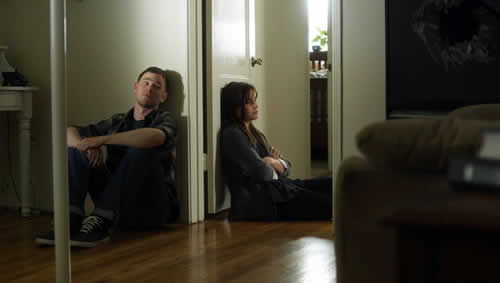
Josh Stolberg: Well I have been making a lot of studio movies over the course of the last ten years, you know movies with big log lines, where you can see the poster and I got my start on stage and felt like I wanted to tell a more personal story, something that probably the studios wouldn’t buy. So we wound up getting very lucky finding a financier who was interested in telling an indie story, a story coming from your personal experience. Several years ago when we had our second child, my wife and I were in a drag out screaming fight with each other, on the night that she was ovulating and we had to go ahead and have despite all the arguing. It was then that the kind of writer in me stood up and said you know this an interesting idea, everyone has these kind of romantic ideas about where babies come from, but the truth is sometime a bit more interesting.
BT: You mentioned that good stories come from personal life experiences; so how much of this story was based on your own experiences and the experiences from the people that you know?
JS: Most of the stories come from ideas that I gathered through friends and some of them came from my own experiences with my wife, but there is a lesbian couple in movie, that are trying to do artificial insemination; so clearly that did not come from my own life but my wife sister is gay and she and her wife went through this process and after talking to them about it we got some great ideas and it was really just an opportunity to tell the story the best I could and capture the act of conception from many different angles.
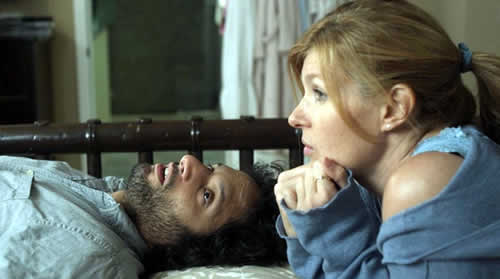 BT: It can be difficult to manage all of these different stories in on film, how did to go about structuring nine stories together while keeping them interesting and related to each other?
BT: It can be difficult to manage all of these different stories in on film, how did to go about structuring nine stories together while keeping them interesting and related to each other?
JS: Well, it really happened through the editing process, the script itself was written in a much more compartmentalized way where I pretty much told each story completely and pretty much in it’s own kind of box. Working with our amazing editor Naomi who put the film together we realized while we were watching the first cut of the movie by the time you get to the third or fourth couple you are expecting the first couple to come back and they never did. Therefore we spent probably six to seven months restructuring the film in a myriad of different ways, trying to find the best way to tell the story. Finding transitions and finding ways to get the scenes to parallel between the different couples and it really was the editor who found the best way to tell the story.
BT: How did you go about casting the film?
JS: Well that was the one aspect to the filmmaking that even it seems to be hard, it turned to be actually one of the easy tasks for me to do. A lot of time actors are getting the same kinds of roles offered to them time and time again and there is also something about big studio movie making, that when you get to set, you spend three hours in make-up and then you are sitting around reading magazines and waiting to shoot your scene and then you shoot two lines of dialogue and then go home. We shot this film in ten days, so every couple worked for one day, and it was a long day, a twelve hours day. We shot between ten and fourteen pages in a day. For example with Johnny Silverman and Jen Finnegan who are two of the actors in our film, we shot a 14 and half page scene which is unheard of in a studio situation, so it was great opportunity for them to really get a feel of it and get the whole thing out at the same time.
BT: How did you balance the challenge of dealing with a serious subject matter while also facing the challenge of making and entertaining film?
JS: I have done some horror movies obviously like Piranha, but a lot of my writing is in the comedy genre, therefore it is really hard for me, even if I am doing a really serious scene,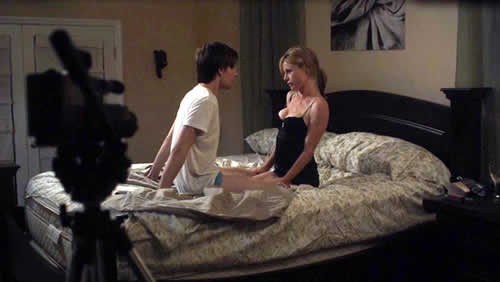 to avoid injecting some sort of humor into the situation. Therefore making Conception where it is all about the characters and about their interpersonal relationships, I knew that I did not want to stay too serious and just get bogged down, there are funny aspects when you are talking about sex and love and especially when you are talking about the difficulties of having kids. Even in the improved moments, we went off book and ha d a little fun, there was one actor Jason Mantzouckas who was doing a scene with Connie Britton and they are both amazing actors and he come from and improv background and there were a couple of scenes there that he squeezed into the film. But when you are filming at this pace and you need to get through 14 pages a day, you really do not have the luxury of stopping down and experimenting much with the dialogue, you really have to get the scenes done and if you have a little time at the end of the day you can then settle and play a little more.
to avoid injecting some sort of humor into the situation. Therefore making Conception where it is all about the characters and about their interpersonal relationships, I knew that I did not want to stay too serious and just get bogged down, there are funny aspects when you are talking about sex and love and especially when you are talking about the difficulties of having kids. Even in the improved moments, we went off book and ha d a little fun, there was one actor Jason Mantzouckas who was doing a scene with Connie Britton and they are both amazing actors and he come from and improv background and there were a couple of scenes there that he squeezed into the film. But when you are filming at this pace and you need to get through 14 pages a day, you really do not have the luxury of stopping down and experimenting much with the dialogue, you really have to get the scenes done and if you have a little time at the end of the day you can then settle and play a little more.
BT: How did you come up with the visual style of the film?
JS: Our DP, Noah Rosenthal, is a really talented guy. He is a young and this was his first film and he was excited about the challenge of shooting the whole film in such a short time. Obviously when you are shooting 14 pages a day you don’t have time to put the camera on a dolly you can’t get on a crane and do those kinds of stuff. So when we sat down and looked through all of the different relationships in the film and finding just a small visual style that is slightly different for each couple. For instance there is a couple in the film played by Leah Pipes and Aaron Ashmore, they are the fighting the makeup sex couple of film, therefore there were very intense fights throughout their scenes and we figured that it would be interesting if we just shoot it with handheld camera. That is the only scene in the entire film that is done with handheld camera. Some of the scenes we used different colors to try and differentiate the character moods, so it was all about finding what visuals would be iconic for certain characters.
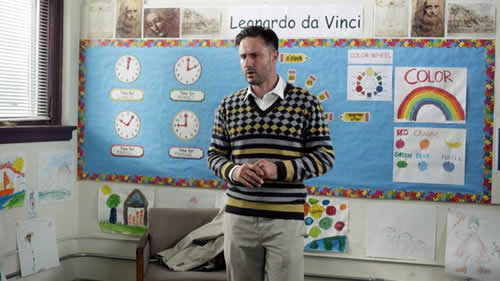 BT: How did you go about working with actors, did you rehearse a lot before filming?
BT: How did you go about working with actors, did you rehearse a lot before filming?
JS: I kind of myself as more of an actor’s director. The whole reason that I made this movie was to get the chance of working with some friends and people that I have known from other films. Therefore obviously each individual actor is has his/her own personality and you have to approach them in different ways. I like to take a hands-off approach and I really feel that it is more about finding something personal in actors. For instance one of the things that we wound up doing from a casting standpoint was to cast couples that were together in real life. It helped us a lot because we were shooting so quickly and we did not have time for rehearsals, what they were bringing from their personal lives onto the set was amazing.
BT: What was your reason from moving from mainstream Hollywood filmmaking to making an independent movie?
JS: Look I love Hollywood and I am not giving up my Hollywood career because I have to pay my rent and put food on the table for my kids. But there is something slightly soul crushing about the Hollywood experience in terms how movies are made, the way that writers are treated on set. I have had those moments where you spend a year and a half of your life working on a screenplay and you think that it is a solid piece of work; the screenplay is sold and yes you get the money but they turn it into something completely different from what you had intended, they don’t include you in the process at all and they basically kick you to the curb. You can only take so much of that before you have to stand up for yourself, this is kind of a passive way of me standing up and saying hey, this is my voice and everything in this film is based on my decisions.
BT: Do you have any new project lined up?
JS: Yes, I have a couple of things that I am really excited about, we just finished up a script for a remake of To Catch a Thief and my other writing partner who I wrote Piranha and Sorority Row with we’re doing and adaptation of a children’s book called Skippy John Jones, which will be an animated film that I am really excited about. I just finished a book adaptation of one of my favorite books of all time, the book is called The Last Samurai, by Helen Dewitt and we have to change the name of the script because of the Tom Cruise movie, but it is a beautiful movie about a mother’s relationship with her genius son.

